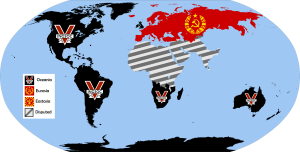Not German. That’s the first thing they tell you, in the Dutch language books and everywhere else. Well, it’s really not. Linguists even date Dutch as the older of the two languages, though with a common ancestor. But there is still some bitterness about Germany’s past outrages, such as their 1974 World Cup victory, their absurd claim that Johan Gutenberg (rather than Coster) invented moveable type, and the German practice of dubbing movies into German, even musicals (even the songs!).
The first thing that foreigners notice about the Dutch language are the distinctive sounds, especially the notorious hard “g”. The hard “g” (often written phonetically as “kh”) works like a password or a secret handshake to identify foreigners (buitenlanders), who rarely master its subtleties. Whether the hard “g” originated by design or by accident remains a mystery. Just as in World War II when the Dutch resistance used Scheveningen as a codeword to spot German infiltrators, so the hard “g” makes it easy to identify foreigners to this day. Even saying “Goedemorgen”, you are already identified as a foreigner, and so the conversation will proceed from there in English, or perhaps some other language.
The hard “g” is even useful for identifying the Belgians, the Vlamingen, who despite sharing a common language and history will live forever on the wrong side of the hard “g” linguistic boundary, perhaps to their eternal sadness. The hard “g” may serve still other uses, such as to clear one’s throat in this perennially rainy environment. In English, you actually have to say “Excuse me,” and turn away and clear your throat, and perhaps drink a glass of water. But in Dutch this all takes place naturally, in practically every sentence, even while you say Goedemiddag, Geweldig, Genoeg, or anything at all in the perfect tense, where verb participles are usually preceded by a hard ge- (gegeten, gezegt, gegaan, enz.), just in case there are Germans or Belgians lurking about.
Dutch can be an economical tongue. Little phrases like “Dat kan” (“That is do-able”) work well. “The most important thing” is simply het belangrijkste, a superlative noun that to an English speaker is missing its noun (why not “het belangrijkste ding?”, well, Dat is niet nodig). Often you even can skip the main verb altogether if the context is clear: “Mag ik het zout (hebben)?” Why waste precious breath on main verbs if it’s not necessary? On the other hand, English speakers do not expect main verbs at the end, and part of our stupefaction with the Dutch language comes from waiting, waiting, waiting for the main verb at the end. Sometimes I will listen to spoken Dutch with about as much comprehension as a dog understanding English until the main verb is finally said, and then all the intermediate words come raining down like pennies from heaven, and then I understand.
Somewhere I picked up the mistaken idea that it was those madcap English people that first called the Dutch the Dutch (it sounds close to “Deutsch”), even though the Dutch themselves call themselves Nederlanders, and their language Nederlands, and their country Nederland—which is all clear, consistent, and conveys the sense of “low lands” very well. However, the etymological dictionary tells us that even in Middle Dutch, we find the word Duutch, which found its way into Middle English as Duch, meaning German or Dutch. Middle English apparently did not distinguish the Dutch language within the vast soup of Mittel Europa that was then called the Holy Roman Empire.
For foreigners attempting to learn the Dutch language, the greatest single obstacle remains the great skill of the Dutch themselves as linguists, especially their uncannily good English. Some Dutch people can sound just like Americans (admittedly, not everyone finds this a desirable goal), and are privy to even the hippest slang of American English. Others speak good British English, which helps the English appreciate the Dutch more than they do other Continentals.
Expatriates attempting to speak Dutch in Amsterdam must show great tenacity, even to get a few seconds into a conversation before the local will switch to English. It’s just not efficient (nor pretty) for the Amsterdammer to watch the poor, un-lettered slob mangle the Dutch tongue, failing to hit the hard “g”, let alone the ui, or ij. The effort is appreciated; the expatriate at least is not a total boor, blithely expecting to be addressed in English just because it’s the lingua franca of our age. But how many will really make the grade and learn Dutch?
While my own sporadic efforts to learn Dutch have yielded only mixed results, there is hope for the future. Our son goes to primary school in Amsterdam, and is learning Dutch from his classmates. His current favorite catch-phrase, repeated endlessly, is “Nee, zeg!” which he translates for us as “Oh, that’s not good.”
Doe maar, jongen.





Be First to Comment